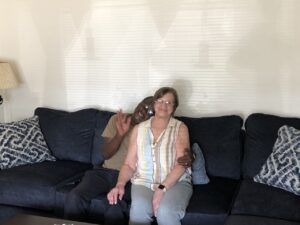SLIPPING THROUGH
“They slipped through the cracks.”
It’s a phrase we hear repeated far too often when we talk about homeless Veterans. Despite the numerous programs and courses available to outgoing military members, there always seem to be those ones who just “slipped through.”
This was the case with Deborah Platten and Michael Gilbert, two Veterans who met long after their service had ended as both struggled to rise up from where they’d been left behind. 
Deborah served in the Air Force in 1979-80 before she was honorably discharged. For his part, Michael Gilbert served in the Army in 1970-71 before being discharged due to medical issues. They lived their post-service lives an entire nation apart — Deborah in Jacksonville, Fla., where she worked as an insurance agent, and Michael thousands of miles away in Washington state, bouncing between homeless mission sites in Seattle. He finally found secure housing across the way in Bremerton and their paths began to converge when, due to her own medical issues, Deborah had to leave her job of 20 years and move to Washington to live with her estranged daughter.
That living situation didn’t work out as planned and Deborah soon ended up on the streets herself. Michael’s own living situation was precarious, after a relationship with a neighbor resulted in him being taken advantage of for his VA benefits. It was during this time that Deborah met Michael through a mutual friend and brother Veteran, Gerald, from the VA. The two hit it off immediately. Deborah moved in with Michael, but past problems with Michael’s former girlfriend and neighbor soon arose and the two were forced to leave the housing complex.
“Well, I said, Oregon is known to protect Veterans and seniors and I think that would be a good fresh start for both of us,” Deborah recalls.
In August 2016 the two made the journey to Oregon and eventually found themselves in Eugene, where they first made contact with St. Vincent de Paul Society of Lane County (SVdP) and Support Services for Veteran Families (SSVF). The two found housing and SSVF was able to support their first two months of rent.
The couple managed to find and keep housing for themselves for three years until they eventually moved to a new property owned by a friend. Things went well at the new location for a year until their friend passed away and a real estate investor obtained the property.
“Prime real estate,” Deborah says. “Those were the first words we kept hearing as soon as that man bought the property. ‘You guys are in prime real estate.’”
Deborah says that overnight, the new owner wanted to double the cost of rent. The two were once again at risk of being unhoused. They struggled with the property owner at the same time the COVID-19 pandemic was happening, but it eventually became clear they couldn’t continue to live at the location.
RE-FINDING SSVF
The two decided to return to SSVF as their housing options ran out. By this time, the SVdP-administered program had undergone expanded eligibility criteria due to the pandemic, which positioned the program to provide even more help to Veterans in the community.
The couple connected with a new case manager, Leasa Stephens, who they say took charge immediately.
“Leasa saved us,” Michael says.
SSVF was able to help pay the inflated cost of their rent for three months to prevent homelessness before moving the couple into a property managed by the Veterans Housing Project (VHP), where they currently live as they prepare to buy their own home.
Michael and Deborah are now looking ahead to being able to buy their own home and finally put an end to their struggle to find security. And SSVF and SVdP are standing by their side all the way to make sure they don’t fall through the cracks again.
We are so thankful that Michael and Deborah gave SSVF another opportunity to help them. Though we continue to work with this Veteran couple and support the next stage of their journey, there are still countless other Veterans at risk of slipping through the cracks in the system and losing their safety net. We want to help catch as many of our service members as we can.
If you know a veteran who could use SSVF’s support contact: Alyssa Hoekman, Program Coordinator (541) 344-0465
ABOUT VHP
SVdP’s Veterans Housing Project (VHP) responds to shelter and housing needs by providing low-barrier entry into transitional housing with individualized case management that supports veterans and their families in the transition to permanent housing. In the past decade, VHP has grown into a case-managed transitional housing program that plays an important role in our community’s continuum of care, providing 43 percent of transitional housing beds for veterans in Lane County. Participants are responsible for making their regular monthly rental payments, determined by household income, and developing a permanent housing plan that includes addressing housing barriers, financial counseling, budget development, and housing stability. This strategy is highly effective in transitioning households into housing stability in collaboration with SSVF


